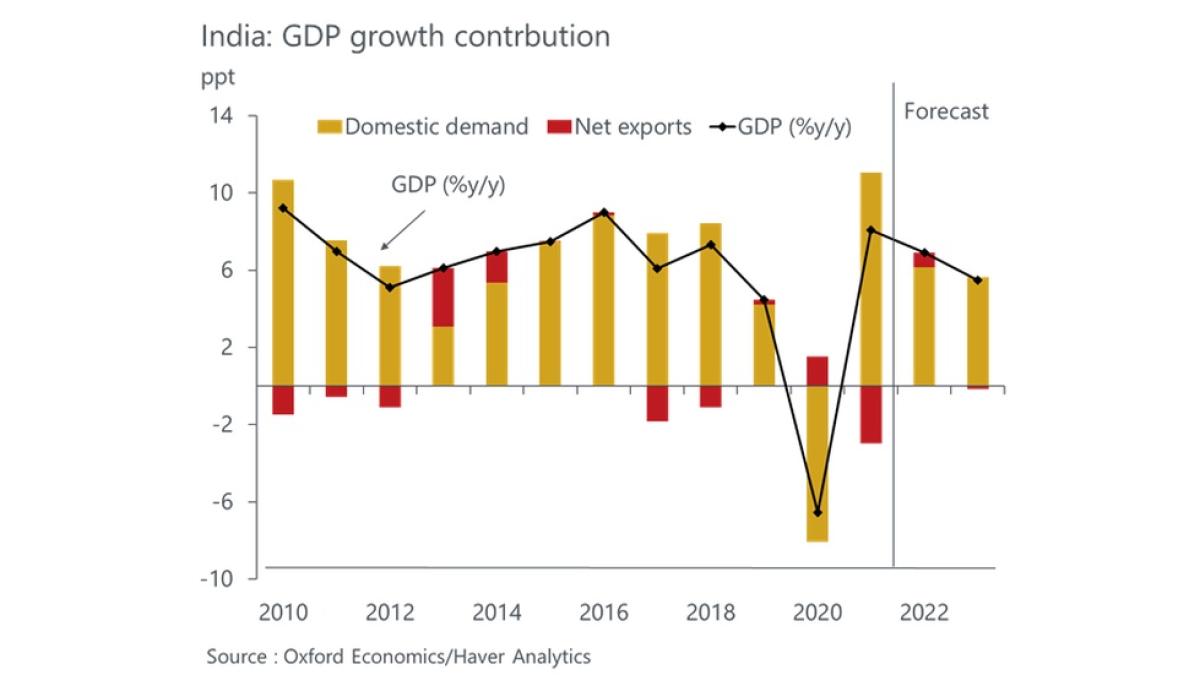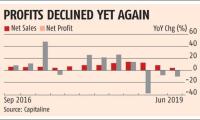Europe Economy Grows 0.3% as Inflation Eases
Europe's economy grew 0.3% in the first quarter of 2023, driven by easing inflation and improved German performance. However, long-term challenges remain.

Photograph: Pulitzer Prize Winner Danish Siddiqui/Reuters
Frankfurt, Apr 30 (AP) Europe's economy perked up slightly at the start of the year, recording 0.3% growth in the January-March quarter compared to the last three months of 2023 as the inflation burden on consumers eased and the stagnating German economy, the continent's biggest, started to show modest signs of life.
The 20-country eurozone recorded its strongest performance since the third quarter of 2022 and improved on shrinkage of 0.1% in each of the last two quarters of 2023, according to official figures released Tuesday by the European Union's statistical agency Eurostat.
The economy had been held back by high inflation that has sapped consumer purchasing power, and by an energy price spike related to Russia cutting off most supplies of natural gas.
Those headwinds have eased as energy prices have fallen and as inflation fell to 2.4% in April. But record high interest rates from the European Central Bank aimed at driving down inflation added another hurdle by raising the cost of credit for businesses and consumers.
Inflation is now not that far from the goal of 2% set by the European Central Bank, leading to speculation that the central bank for the eurozone may cut its benchmark rate in June from its current record high of 4%.
Germany, whose economic sluggishness has provoked ongoing debate about how to restore the economy to growth, expanded 0.2% in the first three months of the year after shrinking 0.5% at the end of last year.
The uptick is welcome but is unlikely to end concerns about long-term issues plaguing Germany such as excessive bureaucracy, shortage of skilled workers, insufficient investment in infrastructure such as rail networks and high-speed internet, and lagging introduction of digital technology in business and government. Germany's well-known structural weaknesses will not disappear overnight and will limit the pace of any rebound this year, said Carsten Brzeski, globl head of macro at ING bank.
France, the second-largest eurozone economy, turned in 0.2% growth while Spain was one of the leading performers with 0.7%. The overall eurozone figure was pushed upward by a 1.1% gain in Ireland, whose economic statistics reflect the multinational corporations that are headquartered there. (AP)
The 20-country eurozone recorded its strongest performance since the third quarter of 2022 and improved on shrinkage of 0.1% in each of the last two quarters of 2023, according to official figures released Tuesday by the European Union's statistical agency Eurostat.
The economy had been held back by high inflation that has sapped consumer purchasing power, and by an energy price spike related to Russia cutting off most supplies of natural gas.
Those headwinds have eased as energy prices have fallen and as inflation fell to 2.4% in April. But record high interest rates from the European Central Bank aimed at driving down inflation added another hurdle by raising the cost of credit for businesses and consumers.
Inflation is now not that far from the goal of 2% set by the European Central Bank, leading to speculation that the central bank for the eurozone may cut its benchmark rate in June from its current record high of 4%.
Germany, whose economic sluggishness has provoked ongoing debate about how to restore the economy to growth, expanded 0.2% in the first three months of the year after shrinking 0.5% at the end of last year.
The uptick is welcome but is unlikely to end concerns about long-term issues plaguing Germany such as excessive bureaucracy, shortage of skilled workers, insufficient investment in infrastructure such as rail networks and high-speed internet, and lagging introduction of digital technology in business and government. Germany's well-known structural weaknesses will not disappear overnight and will limit the pace of any rebound this year, said Carsten Brzeski, globl head of macro at ING bank.
France, the second-largest eurozone economy, turned in 0.2% growth while Spain was one of the leading performers with 0.7%. The overall eurozone figure was pushed upward by a 1.1% gain in Ireland, whose economic statistics reflect the multinational corporations that are headquartered there. (AP)
You May Like To Read
TODAY'S MOST TRADED COMPANIES
- Company Name
- Price
- Volume
- Vodafone Idea L
- 8.10 (+ 18.94)
- 352105814
- GTL Infrastructure
- 1.50 (+ 7.14)
- 20982285
- G G Engineering
- 0.90 (+ 11.11)
- 20091512
- AvanceTechnologies
- 0.54 ( -8.47)
- 18780688
- YES Bank Ltd.
- 17.33 (+ 2.61)
- 14468025






 © 2025 Rediff.com India Limited. All rights reserved.
© 2025 Rediff.com India Limited. All rights reserved.